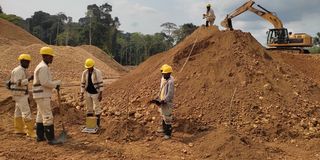Prime
Mineral mining project to displace over 4,000 households in Bugiri, Bugweri, Mayuge and Iganga

About 4,867 households from the districts of Bugiri, Bugweri, Mayuge, and Iganga are at the risk of eviction to pave way for a multi-billion Rare Earth Metal mining project. FILE PHOTO/ COURTESY
What you need to know:
- According to the chairperson of the Rwenzori Rare Metals Company, Mr Richard Kaijuka, the affected persons will be temporarily relocated and after excavation of minerals, the families will be resettled in decent houses that the company will construct
About 4,867 households from the districts of Bugiri, Bugweri, Mayuge, and Iganga are at the risk of eviction to pave way for a multi-billion Rare Earth Metal mining project.
During a meeting conducted in Iganga at the weekend, which attracted politicians, technocrats and other local leaders, it was revealed that government is about to grant the prospecting Rwenzori Rare Metal Company a mining licence.
READ MORE
According to the chairperson of the Rwenzori Rare Metals Company, Mr Richard Kaijuka, the affected persons will be temporarily relocated and after excavation of minerals, the families will be resettled in decent houses that the company will construct.
Mr Kaijuka said this will be effected after the company has signed a memorandum of understanding with the affected individuals.
“Although the project will be taking 27 years, the affected families will be able to return back to their respective homes in between one to five years. But this will depend on the excavation period in a particular area will take. We have been in exploration for more than 10 years and will be submitting our mining list application before October this year,” he said.
Mr Kaijuka said the company, which has partnered with a South African based company, Ionic Rare Earth, will initially invest more than $100 million, with Rwenzori Rare Metal having majority shares.
However, the Member of Parliament (MP) for Bugiri Municipality, Mr Asumani Basalirwa, said the project already started 10 years ago.
“I want to confess this is the first time I am interacting with this information, therefore the line minister should take this issue to Parliament to enable the lawmakers contribute their input to the project,” the MP said.
He also demanded that government should take the responsibility to ensure the affected persons get what is required of them.
The MP for Bunya East, Mr James Kubeketerya, said the area politicians should be involved in the project to ensure that the locals benefit.
The acting director at the Directorate of Geological Survey and Mines in the Ministry of Energy and Mineral Development, Ms Agnes Araba, said an estimated 350 million tonnes of rare earth metal has been discovered and it would be mined for 27 years.
“China is the largest producer of rare earth ore in the world and now Uganda will be the second to China in the world if the project is implemented,” she said.
Rare earth elements are used in the manufacturing of wind turbines, hybrid cars, and carbon lighting applications, such as studio lighting and cinema projection; it’s also used to create strong metals for aircraft engines, among others.
“Any electronic device is made up of some portions of the rare earth metal, therefore, I am optimistic that the project will support the country’s economic development,’’ Ms Araba said.
She said for the last 10 years the Rwenzori Rare Mental Company has been on the ground carrying out the exploration of the minerals after the government granted them an exploration licence, and soon they will be granted a mining licence.
But some locals who were contacted resisted the proposal and asked to be compensated.
Rare earth elements
Rare earth elements are a group of specialty metals with unique physical and chemical properties which are in high demand for the production of many modern technologies and emerging industries.
Products such as electric and hybrid cars, renewable energy technologies, telecommunications and modern medical equipment all rely on these rare earth elements.




